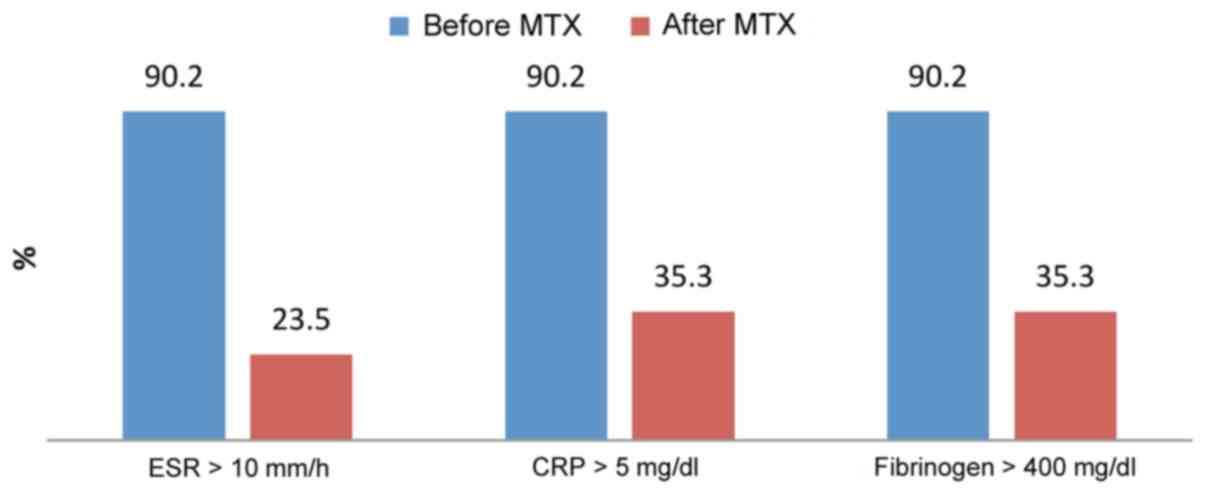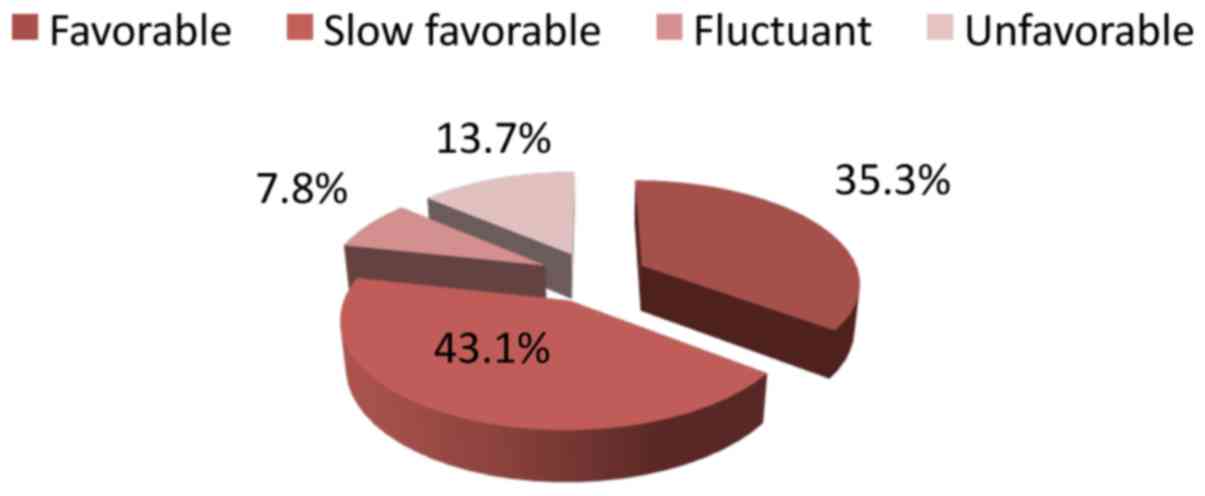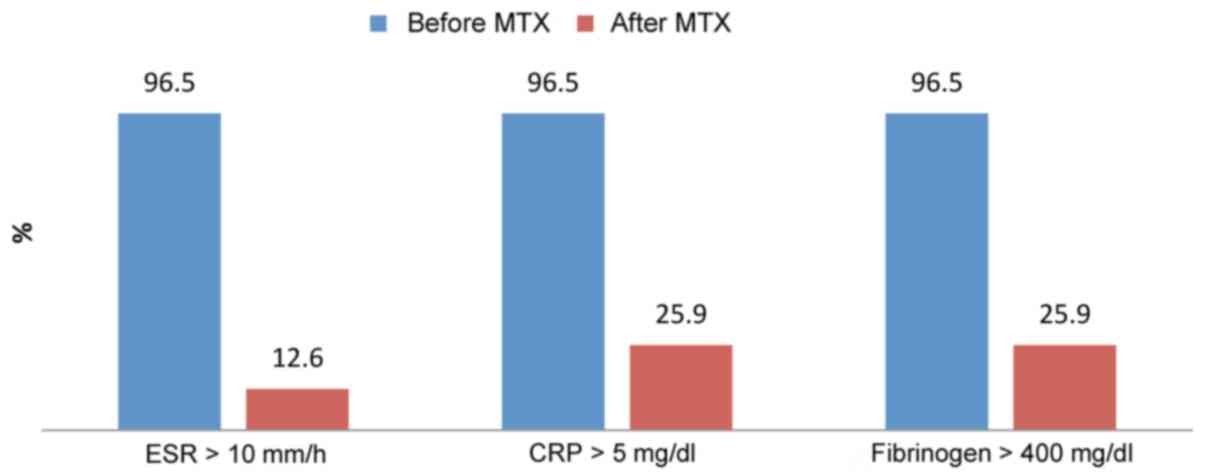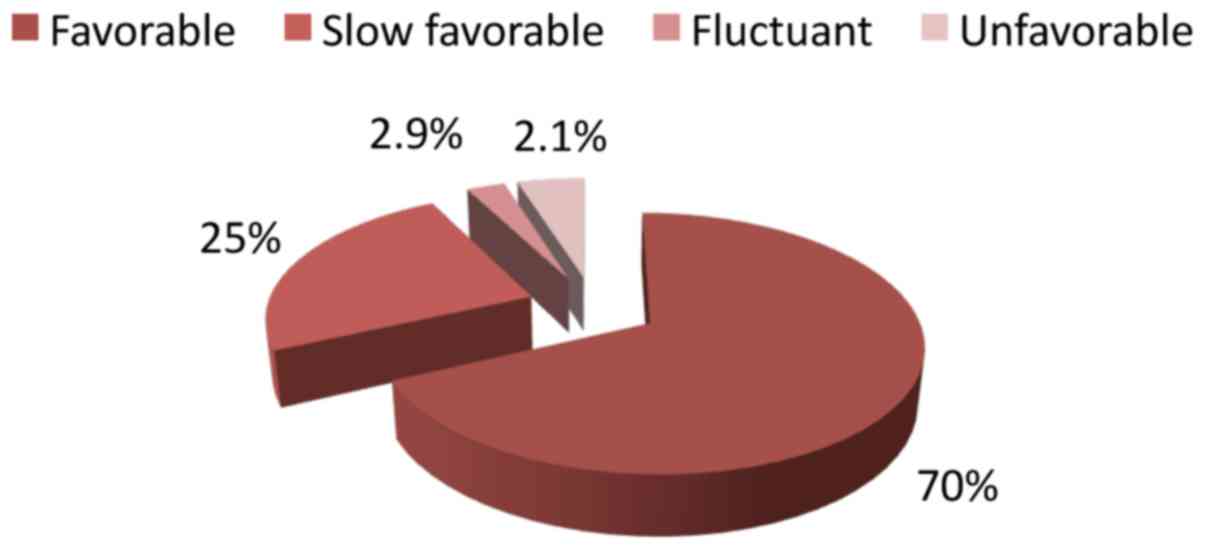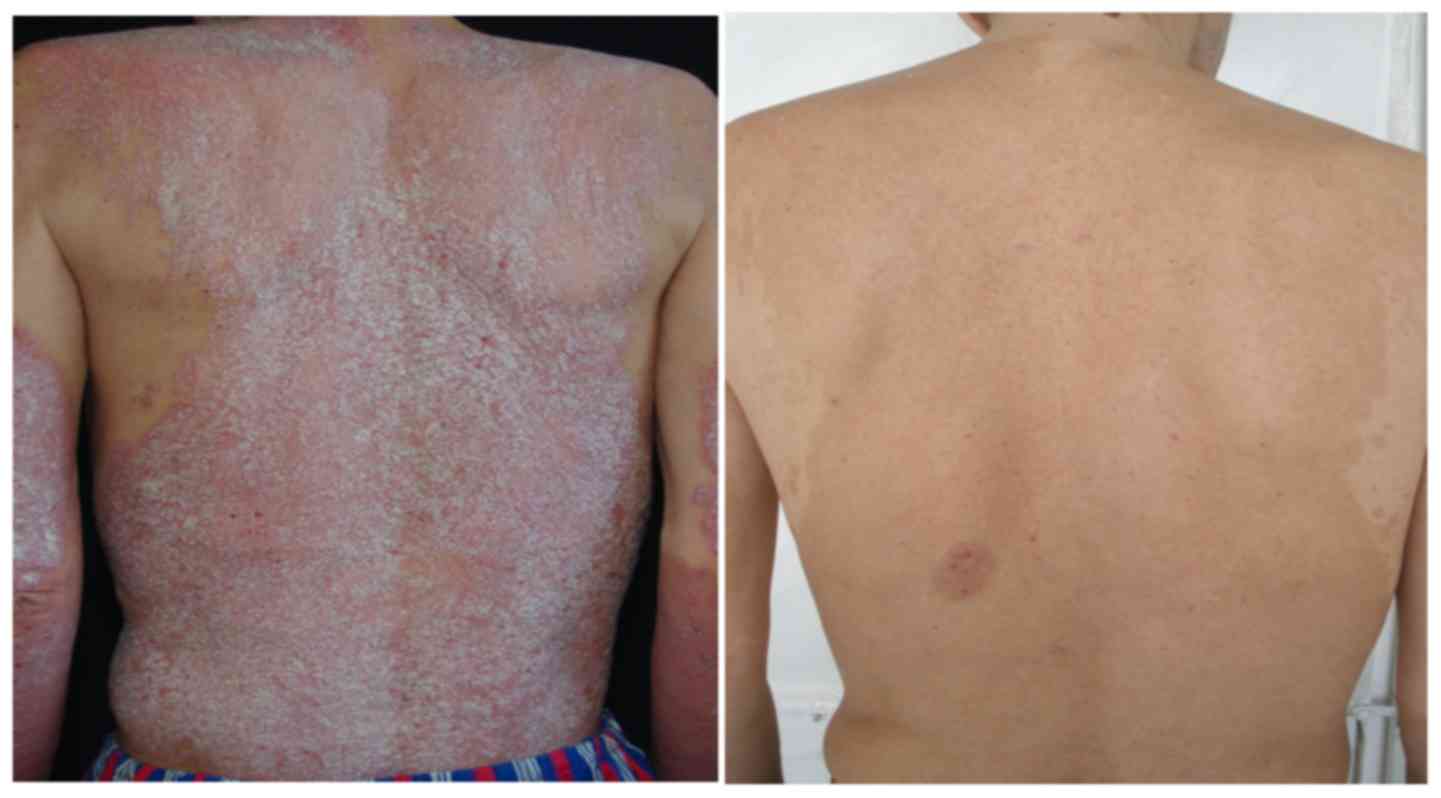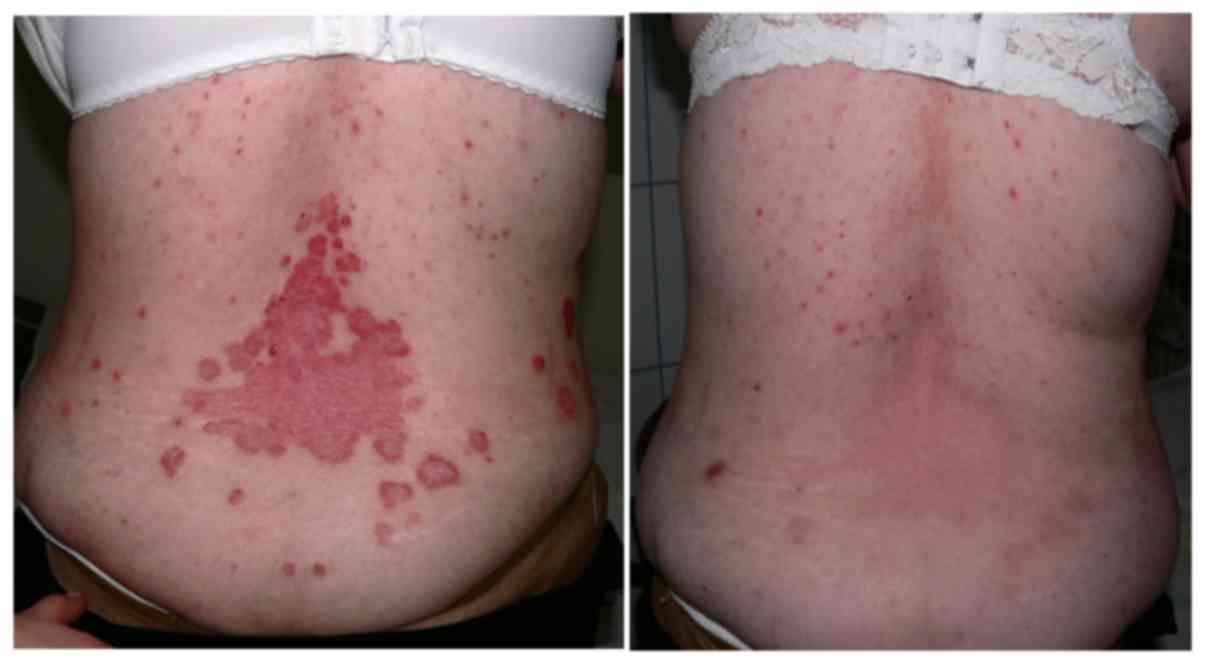|
1
|
Lin X and Huang T: Co-signaling molecules
in psoriasis pathogenesis: Implications for targeted therapy. Hum
Immunol. 76:95–101. 2015.PubMed/NCBI View Article : Google Scholar
|
|
2
|
Ghosh A and Panda S: Recent understanding
of the etiopathogenesis of psoriasis. Indian J Paediatr Dermatol.
18:1–8. 2017.
|
|
3
|
Caruntu C, Boda D, Dumitrascu G,
Constantin C and Neagu M: Proteomics focusing on immune markers in
psoriatic arthritis. Biomarkers Med. 9:513–528. 2015.PubMed/NCBI View Article : Google Scholar
|
|
4
|
Căruntu C, Boda D, Musat S, Căruntu A and
Mandache E: Stress-induced mast cell activation in glabrous and
hairy skin. Mediators Inflamm. 2014(105950)2014.PubMed/NCBI View Article : Google Scholar
|
|
5
|
Farshchian M, Ansar A, Sobhan M and
Hoseinpoor V: C-reactive protein serum level in patients with
psoriasis before and after treatment with narrow-band ultraviolet
B. An Bras Dermatol. 91:580–583. 2016.PubMed/NCBI View Article : Google Scholar
|
|
6
|
Lowes MA, Suárez-Fariñas M and Krueger JG:
Immunology of psoriasis. Annu Rev Immunol. 32:227–255.
2014.PubMed/NCBI View Article : Google Scholar
|
|
7
|
Li R, Wang J, Wang X, Zhou J, Wang M, Ma H
and Xiao S: Increased βTrCP are associated with imiquimod-induced
psoriasis-like skin inflammation in mice via NF-κB signaling
pathway. Gene. 592:164–171. 2016.PubMed/NCBI View Article : Google Scholar
|
|
8
|
Pepys MB and Hirschfield GM: C-reactive
protein: A critical update. J Clin Invest. 111:1805–1812.
2003.PubMed/NCBI View
Article : Google Scholar
|
|
9
|
Rocha-Pereira P, Santos-Silva A, Rebelo I,
Figueiredo A, Quintanilha A and Teixeira F: The inflammatory
response in mild and in severe psoriasis. Br J Dermatol.
150:917–928. 2004.PubMed/NCBI View Article : Google Scholar
|
|
10
|
Gisondi P, Lora V, Bonauguri C, Russo A,
Lippi G and Girolomoni G: Serum chemerin is increased in patients
with chronic plaque psoriasis and normalizes following treatment
with infliximab. Br J Dermatol. 168:749–755. 2013.PubMed/NCBI View Article : Google Scholar
|
|
11
|
Qu D, Liu J, Lau CW and Huang Y: IL-6 in
diabetes and cardiovascular complications. Br J Pharmacol.
171:3595–3603. 2014.PubMed/NCBI View Article : Google Scholar
|
|
12
|
Devaraj S, Valleggi S, Siegel D and Jialal
I: Role of C-reactive protein in contributing to increased
cardiovascular risk in metabolic syndrome. Curr Atheroscler Rep.
12:110–118. 2010.PubMed/NCBI View Article : Google Scholar
|
|
13
|
Biljan D, Situm M, Kostović K, Batinac T
and Matisić D: Acute phase proteins in psoriasis. Coll Antropol.
33:83–86. 2009.PubMed/NCBI
|
|
14
|
Isha, Jain VK and Lal H: C-reactive
protein and uric acid levels in patients with psoriasis. Indian J
Clin Biochem. 26:309–311. 2011.PubMed/NCBI View Article : Google Scholar
|
|
15
|
Negrei C, Ginghină O, Căruntu C, Burcea
Dragomiroiu GT, Jinescu G and Boda D: Investigation relevance of
methotrexate polyglutamates in biological systems by high
performance liquid chromatography. Rev Chim. 66:766–768. 2015.
|
|
16
|
Boda D, Negrei C, Nicolescu F and Balalau
C: Assessment of some oxidative stress parameters in methotrexate
treated psoriasis patients. Farmacia. 62:704–710. 2014.
|
|
17
|
Zamanian A, Houshang Ehsani A, Bahareh
Darvari S, Mehran G and Azizpour A: Trend of C-reactive protein
anderythrocyte sedimentation rates in psoriatic patients on
treatment of standard protocol of infliximab. GMJ. 4:8–13.
2015.
|
|
18
|
Strober B, Teller C, Yamauchi P, Miller
JL, Hooper M, Yang YC and Dann F: Effects of etanercept on
C-reactive protein levels in psoriasis and psoriatic arthritis. Br
J Dermatol. 159:322–330. 2008.PubMed/NCBI View Article : Google Scholar
|
|
19
|
Kanelleas A, Liapi C, Katoulis A,
Stavropoulos P, Avgerinou G, Georgala S, Economopoulos T,
Stavrianeas NG and Katsambas A: The role of inflammatory markers in
assessing disease severity and response to treatment in patients
with psoriasis treated with etanercept. Clin Exp Dermatol.
36:845–850. 2011.PubMed/NCBI View Article : Google Scholar
|
|
20
|
Olteanu R, Constantin MM, Zota A,
Dorobantu DM, Constantin T, Serban ED, Balanescu P, Mihele D and
Gheuca-Solovastru L: Original clinical experience and approach to
treatment study with interleukine 12/23 inhibitor in
moderate-to-severe psoriasis patients. Farmacia. 64:918–921.
2016.
|
|
21
|
Olteanu R, Zota A and Constantin M:
Biosimilars: An update on clinical trials (review of published and
ongoing studies). Acta Dermatovenerol Croat. 25:57–66.
2017.PubMed/NCBI
|
|
22
|
Coimbra S and Santos-Silva A: Biomarkers
of psoriasis severity and therapy monitoring. World J Dermatol.
3:15–27. 2014.PubMed/NCBI View Article : Google Scholar
|
|
23
|
Gocalp H: Effect of psoriasis severity on
inflammation parameters: Controlled study. Turk Arch Dermatol
Venereol. 52:91–94. 2018.
|
|
24
|
Căruntu C, Boda D, Căruntu A, Rotaru M,
Baderca F and Zurac S: In vivo imaging techniques for psoriatic
lesions. Rom J Morphol Embryol. 55 (Suppl 3):1191–1196.
2014.PubMed/NCBI
|
|
25
|
Ilie MA, Caruntu C, Lixandru D, Tampa M,
Georgescu SR, Constantin MM, Constantin C, Neagu M, Zurac SA and
Boda D: In vivo confocal laser scanning microscopy imaging of skin
inflammation: Clinical applications and research directions. Exp
Ther Med. 17:1004–1011. 2019.PubMed/NCBI View Article : Google Scholar
|
|
26
|
Negrei C, Caruntu C, Ginghina O,
Dragomiroiu GT, Toderescu CD and Boda D: Qualitative and
quantitative determination of methotrexate polyglutamates in
erythrocytes by high performance liquid chromatography. Rev Chim.
66:607–610. 2015.
|
|
27
|
Negrei C, Arsene AL, Toderescu CD, Boda D
and Ilie M: Acitretin treatment in psoriasis may influence the cell
membrane fluidity. Farmacia. 60:767–771. 2012.
|















